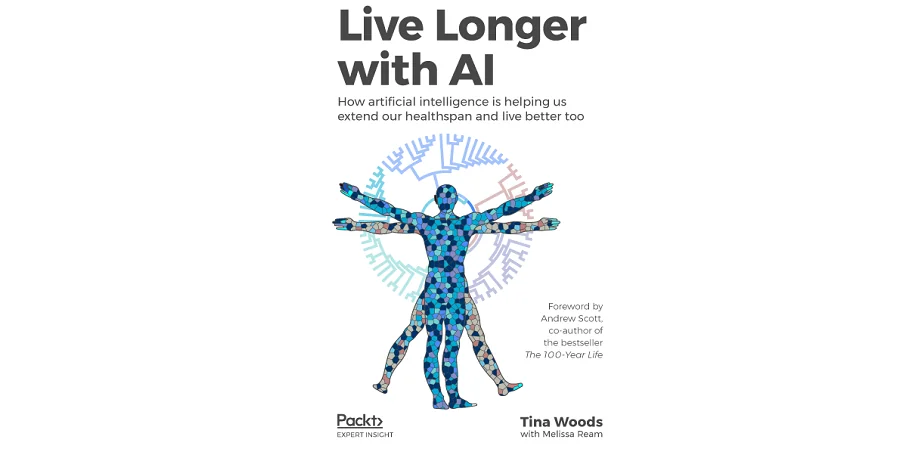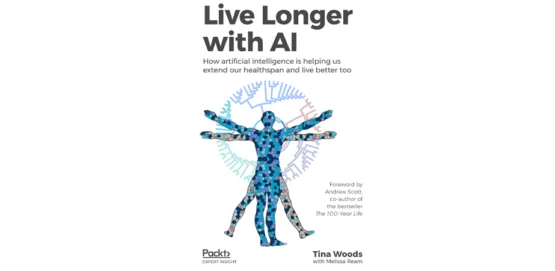Artificial intelligence is the next big thing in medicine, or, using Silicon Valley’s jargon, the next big disruptor. Not a thing of the future, AI is already here, changing our lives, and soon our healthcare, beyond recognition. Given how rapidly AI is invading the field of longevity research, it was only a matter of time until a proper book on the subject appeared. Tina Woods arrived first by publishing “Live Longer with AI”.
Tina is a social entrepreneur with a focus on health innovation. She is the founder and CEO of Collider Health and Collider Science as well as the co-founder and CEO of Longevity International, which runs UK’s All Party Parliamentary Group for Longevity. She participates in the important work of connecting various players – academia, government, business – and facilitates their cooperation in the longevity field.
Despite being written in about a year, “Live Longer with AI” is vast. It stretches far beyond the topic of AI and longevity to include everything from the basics of the biological machinery of aging to the ethics of immortality. This makes the book a decent entry point to our field for anyone ready to tackle its 560 pages. On the bright side, the reading is far from boring. “Live Longer with AI” explores current concepts, raises pressing questions, and tells fascinating stories of discovery and innovation. A large part of the book is dedicated to interviews with some of the field’s leaders, including Aubrey de Grey, Alex Zhavoronkov, and our own Keith Comito, president of Lifespan.io.
AI as it exists today is mostly about mining big data in search for patterns, and it has become very good at it. Medicine, on the other hand, has acquired mountains of data that traditional analyses cannot make full sense of. There are also enormous amounts of data that lie beyond the realm of medicine but are nevertheless extremely important to our health: environmental, behavioral, etc. The job of AI is to connect these billions of dots revealing the whole picture, and the importance of this job cannot be overstated. We may be unable to substantially advance medicine and healthcare without employing AI on a major scale.
AI is already in use in medical imaging, where its success is based on the same powerful image recognition algorithms that Facebook employs to tag your friends in a photo. The success rate of AI trained on thousands and millions of images has already largely surpassed that of a human specialist, and although scans are still checked by a human, this stage is becoming increasingly obsolete. AI is incredibly fast and unaffected by fatigue, hunger, mood swings, domestic problems, or any other factor that can cloud human judgement. More importantly, it continually learns by instantaneously sharing information with its “colleagues” all over the world.
This brings us to the extremely important topic of data sharing that receives a lot of attention in the book: how can data be shared between healthcare companies, medical institutions, organizations, and nations? What are the optimal ethics of data sharing that ensure both individual privacy and rapid training of life-saving algorithms? How do we make people less wary of sharing their personal data? Which model is ultimately better for people: that of China, which cares little about privacy and human rights but could deliver better results and propel China to the pole position in the worldwide AI race? Or is it better to stick with the European model, a much more cautious one, that may impose too many barriers? “Live Longer with AI” does not have all the answers because no one does, but it brings you valuable opinions from some of the best experts in the field.
Yet another field in which AI is currently doing wonders is the discovery of new drugs. One of the well-known pioneers of AI-powered drug discovery is Alex Zhavoronkov’s company, Insilico, which recently made headlines for discovering a new drug in a record-breaking 46 days. AI greatly expedites the process and saves a lot of money by quickly analyzing the chemical properties of thousands of molecules. During the current pandemic, AI was used to suggest candidates for COVID-19 vaccines.
The painful subject of COVID-19 reverberates through the book, which was mostly written after the pandemic began. Tina asks her interviewees what lessons the pandemic taught them and gets some interesting answers. Most of them agree that the virus has illuminated the need for a faster, more effective cooperation and data analysis on a global scale, which is exactly where AI shines.
AI is changing our approach to healthcare in numerous ways. One of them is mining “healthy” data. Currently, our healthcare system mostly collects data about us when we get sick. Until very recently, nobody was collecting the same data (blood pressure, heart rate, oxygen levels, sleep quality and dozens of other parameters) from people who are healthy or who think they are healthy. Needless to say, when we feel ill, it is already often past the optimal point for starting treatment. AI is powering the emerging universe of devices (wearables, smart homes, smart cars, etc.) that constantly monitor our health and behavior, advising us on lifestyle and dietary changes and alerting us of possible problems. Collecting “healthy” data from all over the world will open entirely new possibilities for diagnostics and treatment. Maybe even more importantly, these smart devices allow us to take better care of our bodies. Another type of data that is highly relevant for public and personal health is environmental (pollution, noise), and it can also be gathered by AI-infused gadgets.
One of the game-changers in healthcare and longevity research that the book discusses is the increasing presence of large tech companies. Healthcare is one of our basic needs and an enormous market, and Big Tech is extremely well positioned here, having both access to vast amounts of user data and the tools to analyze it, including AI. Healthcare is also one of the few directions that Big Tech can significantly grow in. While the public may distrust yet another “takeover” by the tech giants, their resources and expertise could actually do a lot of good. It will depend in large part on their ability to cooperate with each other and with established healthcare companies that possess a different kind of expertise. We have already seen evidence of such cooperation, like the Amazon – Berkshire-Hathaway deal.
However, AI is not confined to Big Tech headquarters. On the contrary, it can be quite egalitarian. Thanks to cloud computing, startups in healthcare can get access to the world’s most powerful AI engines. Modern technology has been “the great equalizer” for quite some time now. The Internet and smartphones have bridged many gaps between developed and developing nations. They can ensure that advances in medicine benefit humanity as a whole and not just the lucky billion who happen to live in rich countries. AI-powered diagnostics and telemedicine can reach even the most remote and poor parts of the world, potentially ushering in a new era of increasing life expectancy there.
AI can be good for healthcare as a whole, but how can it benefit longevity research? To conquer age-related diseases, we probably must move “upstream”, closer to their common causes, the hallmarks of aging, and the superior ability of AI to connect the dots can prove invaluable here. We have reported on several studies that employ this “connecting the dots” strategy, including a study that was based on what is probably the largest open genomic database in the world – UK Biobank. Upon analyzing 100 thousand human genomes along with the accompanying healthcare data, the study found genetic correlations between various age-related diseases and even suggested existing drugs that can be used for holistic treatment of these diseases. Here is another example: in our interview with Alexander Fedintsev, he lamented the potential difficulty of finding a molecule that can break glucosepane crosslinks that stiffen the extracellular matrix (Fedintsev considers such stiffening immensely important and a new hallmark of aging). AI, with its superior molecule-analyzing abilities, can be of great help here.
“Live Longer with AI” also touches on one of the most contentious questions that divides the longevity community: should we aim at extreme life extension? Is it politically wise to speak about it? Is it even feasible? Would we be better off promoting the modest and prudent vision of healthspan extension? Tina Woods slips this question into most of her interviews. As one would expect, the answers vary widely, from Aubrey de Grey’s extreme vision of the future to much more subdued forecasts, altogether amounting to a fascinating and productive discussion.
“Live Longer with AI” is a demanding but rewarding read. By canvassing dozens of topics, it certainly gives the reader a lot of food for thought. The importance of AI in medicine and in longevity research in particular will only go up. This makes it a thrilling topic to familiarize yourself with, and Tina Woods’ book provides a solid starting point.



